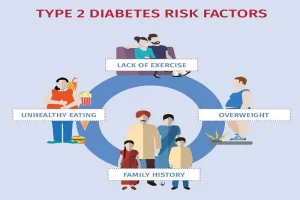Sorry, nothing in cart.
What is type 2 diabetes?
- By admin
- |
- General Blog
- |
Type 2 diabetes is caused by a problem with the way the body regulates and uses sugar as fuel. That sugar is also known as glucose. This long-term disorder causes too much sugar to circulate in the blood. High blood sugar levels can eventually lead to cardiovascular, neurological, and immune system issues. The pancreas-produced hormone insulin is in charge of regulating the amount of glucose in the blood.
Types of Diabetes
- Type 1 Diabetes
- Type 2 Diabetes
- Gestational diabetes
Type 1 Diabetes: the pancreas does not produce insulin.
Type 2 Diabetes: occurs when the pancreas does not produce enough insulin or when the body’s cells do not respond to insulin.
Gestational diabetes: Diabetes that can develop during pregnancy in women who do not have diabetes currently.
What causes type 2 diabetes?
Type 2 diabetes is usually caused by a combination of factors. They could include:
1) Genes Scientists have discovered various pieces of DNA that influence how your body produces insulin.
2) Weight Insulin resistance can be caused by being overweight or obese.
3) Syndrome of metabolism Insulin resistance is frequently associated with several conditions, including high blood sugar, high blood pressure, and high cholesterol and triglycerides.
4) Your liver has overproduced glucose when your blood sugar drops, your liver produces and excretes glucose. When you eat, your blood sugar rises, and your liver usually slows down and stores glucose for later use. However, some people’s livers do not. They continue to produce sugar.
5) Cells that are not communicating effectively can send incorrect signals or fail to recognize messages. Diabetes can develop when these issues affect how your cells produce and use insulin or glucose.
6) Beta cells that have been broken when the cells that produce insulin release it at the incorrect moment, and your blood sugar levels fall. High blood sugar levels might also damage these cells.

What are the symptoms of diabetes?
Several factors contribute to type 2 diabetes, including:
The more common type of diabetes, type 2, can occur at any age. People over the age of 40 are more likely to develop type 2 diabetes. However, the prevalence of type 2 diabetes in youngsters is rising.
- Increased thirst and urination
- Increased hunger
- Feeling exhausted
- Blurred vision
- Numbness or tingling sensations in the feet or hands
- Sores that do not heal
- Weight loss that has not been explained
If you exhibit these symptoms, you should consult your doctor.
Is Type 2 diabetes genetic?
T2D is complicated, but experts know that genetics plays a significant influence. If one of your biological parents has T2D, your lifetime risk is 40%, and it is 70% if both of your biological parents have it.
At least 150 DNA variants have been connected to the chance of having T2D, with some increasing your risk and others decreasing it. Some of these changes may have a direct impact on insulin resistance and production. Others may enhance your risk of T2D by making you more likely to be overweight or obese.
These genetic variants, together with health and lifestyle factors, are likely to influence your overall risk of T2D.
Treatment
Diet
Request that your healthcare physician or a trained dietician recommend a food plan that is appropriate for you. What you eat, how much you eat, and when you eat all play a role in keeping your blood sugar levels within the range recommended by your healthcare provider.
The key to eating with Type 2 diabetes is to eat a range of healthful foods from all food categories in the proportions specified in your meal plan.
Exercise
Every day, aim for 30 to 60 minutes of physical activity. You can walk, ride your bike, swim, or do anything else that raises your heart rate. Combine this with strength exercises, like yoga or weightlifting. If you use a blood sugar-lowering prescription, you may require a snack before working out.
Check your blood sugar levels
Depending on your therapy, particularly if you’re on insulin, your doctor will advise you on when and how frequently you should test your blood sugar levels.
Medication for Type 2 Diabetes
Oral diabetic drugs: These are medications taken orally to assist in maintaining blood sugar levels in patients with T2D who still produce some insulin. Rybelsus 3 mg is the most commonly prescribed oral medicine for the condition. To obtain the best blood glucose control, your provider may prescribe more than one oral diabetes medication at once.
GLP-1 and dual GLP-1/GIP agonists: Semaglutide primarily helps persons with T2D maintain their blood sugar levels. Some GLP-1 agonists can also aid in the treatment of obesity.
Insulin: Synthetic insulin decreases blood sugar levels immediately. Insulin is available in a variety of forms, including long-acting and short-acting insulin. You can use syringes or pens to inject it, inhale it, or use an insulin pump.
Other Variants:
Rybelsus (Oral semaglutide):
Ozempic (Semaglutide injection):
Conclusion
Type 2 diabetes is a chronic condition that happens when you have persistently high blood sugar levels (hyperglycemia).
Type 2 diabetes is very common. More than 37 million individuals are in the United States. Have diabetes (about 1 in 10 people), and about 90% to 95% of them have Type 2 diabetes.
FAQs
Q1) Can Type 2 diabetics live a long life?
Ans: The younger a person is when they are diagnosed with type 2 diabetes, the more likely it is that diabetes-related problems may shorten their life. However, by implementing effective treatment measures, a person with type 2 diabetes has a good chance of living as long as a person without the illness.
Q2) what is type 2 diabetes for beginners?
Ans: Type 2 diabetes is caused mostly by two issues: Insulin resistance develops in muscle, fat, and liver cells. As a result, the cells are unable to absorb sufficient sugar. The pancreas cannot produce enough insulin to maintain normal blood sugar levels.
Q3) how do you deal with diabetes type 2?
Ans: You may be able to control your diabetes by eating well and exercising, or your doctor may prescribe insulin, other injectable treatments, or oral diabetes medications to help you regulate your blood sugar and avoid complications.
Q4) How long can a 25-year-old live with diabetes?
Ans: Patients with Type 1 and Type 2 diabetes are anticipated to live an average of 70.96 and 75.19 years at the end of the observation period, respectively. The combined diabetes life expectancy is 74.64 years, which is equivalent to the general population’s life expectancy.
Q5) what should Type 2 diabetics eat?
Ans: If you have type 2 diabetes, there is nothing you cannot consume, but you must limit some foods. Eat a variety of foods, including fruits and vegetables, as well as starchy carbohydrates like spaghetti. Limit your intake of sugar, fat, and salt.
Q6) what foods can a diabetic not eat?
Ans: You cannot eat this food
- Fried foods.
- Foods high in saturated or trans-fat.
- Particularly salty dishes.
- Foods or drinks with extra sugar.
Q7) what organs does type 2 diabetes affect?
Ans: Long-term diabetes-related health concerns include: damage to big blood arteries in the heart, brain, and legs (macrovascular complications); and damage to small blood vessels in the eyes, kidneys, feet, and nerves (microvascular complications).
Q8) Can diabetics drink alcohol?
Ans: Long-term alcohol consumption in well-nourished diabetics can lead to elevated blood sugar levels.
Q9) Can diabetics eat rice?
Ans: Rice can be included as part of a healthy balanced diet for those with diabetes and prediabetes. Choosing more intact, higher-fiber rice and keeping portion sizes in check may help keep blood glucose levels in the target range.
Q10) what is the main cause of type 2 diabetes?
Ans: If you are not physically active and are overweight or obese, you are more prone to acquire type 2 diabetes. Extra weight can lead to insulin resistance, which is common in people with type 2 diabetes. The distribution of body fat is also crucial.
 English
English
 French
French  German
German